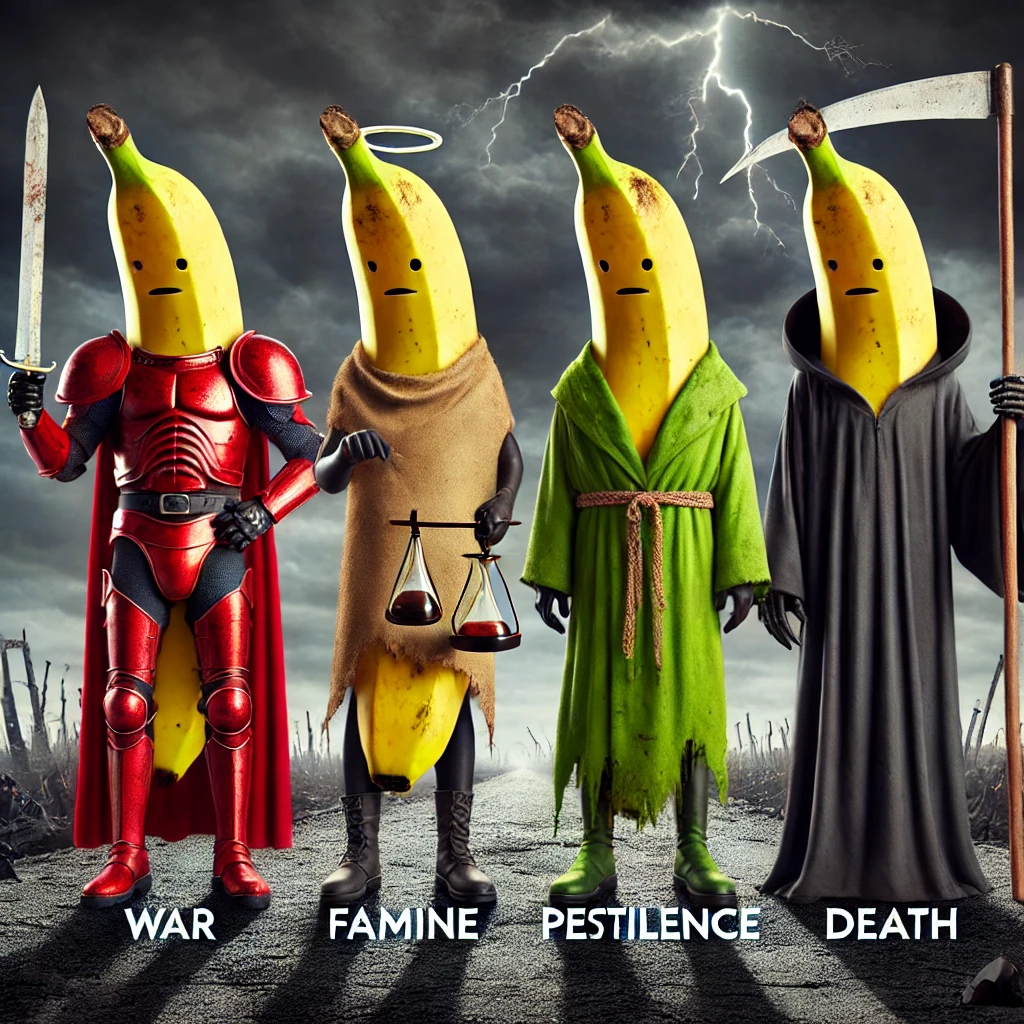Good research but as they point out, the much simpler solution is simply to grow a variety of different bananas instead of one clone across the entire earth.
science
A community to post scientific articles, news, and civil discussion.
rule #1: be kind
<--- rules currently under construction, see current pinned post.
2024-11-11
I wonder if there is an ureported reason that they haven't done that. Because I think your idea makes sense, and surely they must have a reason for not doing it.
My understanding is they store well and consumers are used to them. There are definitely many other varieties available in local markets in tropical areas, some of which are better tasting IMO. But it’s just one of those things about global commodity trade that they want them all to be identical.
Consumers adapt to observable diversification if the product is superior and significantly different. They are almost totally ignorant if the differences are small and the product is similar. That's not the reason.
The issue is that most of the banana production is handled by very few companies. Changing varieties complicates their internal processes, will cost them money, and they will not do it until forced to do so.
Good point. The banana industry is absolutely gargantuan (and pretty awful, but that’s an aside) so it may be that their logistics require the fruit to be a certain size, weight, shape, etc for efficiency.
also like, a lot of banana variants are so much more interesting and people go out of their way to get them, you ought to be able to charge more simply for providing something unique to people.
It probably comes down to the difficulty of of transport. We have a local fruit in the Eastern US, the Pawpaw. It's a fantastic fruit and has a history of cultivation in the area. But, it does not transport well and has to be eaten pretty quickly after they ripen. So, it's not a wide commercial success.
Label it new, special, and exotic, and people will buy it. Marketing is a hell of a drug.
and the convenient bit is that it would all be true, because most people in the west have at most experienced 3 species of banana in their lives.
also bananas are honestly really fucking cheap in comparison with other fruits, i'd happily pay another dollar per kg for some more interesting bananas.
Likely consistency of the product. The Cavandish cultivar is a clonal population; it makes then very susceptible to disease but also very consistent in terms of size and taste over time. The original Gros Michel cultivar was similar but then devastated by panama disease. It was also supposedly tastier and better.
But Plantains are also bananas and totally different in terms of taste and consistency. If you were to freely cultivate bananas there is a huge range of possible tastes and textures.
Thats not to say its not feasible; a range of cultivars could be developed. Its also worth bearing in mind that most farmers do not generally develop new cultivars; their business is mass producing the fruit. People experimenting with new cultivars are effectively fringe and it's likely difficult to break into a market where consumers expectations of what a banana is are so fixed. Most people don't even think of a plantain as a banana. Its hard to break in and make money with different bananas as people expect a banana to he a Cavendish.
Unfortunately consumers and retailers are the enemy of variety. Even fruits where people known there are varieties, such as Apples, are dominated by a couple of commerical cultivars. And that extends across into many plants and even animal products - there is huge commercial pressure for homogenous consistent products which in the shirt term out weighs long term risks of bad agricultural practicea.
The original Gros Michel cultivar... was also supposedly tastier and better.
The banana flavoring used in candies and baked goods came from the Gros Michel, so if you like banana flavored things, but don't like actual bananas, this is why.
This person knows their bananas.
The current banana is cheapest to transport. They can be harvested when still unripe and ripe along the way, so no expensive fast transport is needed. They're are many other varieties, but this one was the easy moneymaker.
"Banana apocalypse" my ass, I'm not a banana.
Call me when bananas start falling from the sky, oceans turn into banana juice, and the Son of Banana returns.
The 4 bananas of the apocalypse ride in.

Aw, yours are better!
And I saw when the Lamb opened one of the seals, and I heard, as it were the noise of thunder, one of the four beasts saying, Come and see.
And I saw, and behold a white horse:

Not planting in monocultures for example?
Mixing with other crops might help already.
I assume this will once again be conversion to yet less tasty bananas.
If you're in the United States and not in a tropical area, a website called Miami Fruit will ship you a banana sampler with some of the bananas you've been missing. Cavendish bananas are garbage.
$127 for 5 pounds of bananas, I live not too far from Miami I would be cheaper to drive there
yeah that is not my level of cashflow.
Mine neither, but they have sales and coupons once in awhile. My friends and I pitched in and we got about twenty pounds of exotic fruit for about $200, although it HAS been a few years. They might be price gouging like everyone else now.
Isn't this the 3rd banana apocalypse at least?
I think it's only the 2nd:
Scientists have long feared TR4’s introduction into the Americas. Still, Stuart Thompson explains for the Conversation, the infectious outbreak is not wholly unprecedented: During the mid-20th century, a related strain of Fusarium wilt destroyed plantations across Latin America, paving the way for a shift from the predominant “Gros Michel” banana variety to the “Cavendish” version commonly seen today.
Also, Fusarium is known as Panama Disease.
Isn't this the reason why some banana candy flavors seem to taste weird? Because they were developed when bananas tasted different?
Yes. The artificial flavor for banana was created in the 19th century when big michael was the common variety.
I feel like sensationalist headlines like this only have a boy who cried wolf effect. Using words like "apocalypse", really?
It's already happened once.
The Big Mike banana was super popular until the 1950s, when a fungal infection basically wiped them out. (they're still grown in a few places, but are super susceptible to infection)
So, the banana growers switched over to the Cavendish banana. It was resistant to the fungus.
But the days of the Cavendish were always numbered because of how they're grown. A seedless banana can only grow via cuttings. Which is how they've been grown since the beginning. Every single banana on the shelf at your local supermarket is genetically identical. They've been identical since the 50s, and the fungus has adapted to them. Worse still, the particular fungus that's now attacking the Cavendish cultivar is extremely resistant to fungicides.
So yeah, without some sort of massive shift in genetic diversity, the Banana will no longer be a thing in Central America. Do note, that the banana is not a native plant in the Americas, and is cultivated widely in Southeast Asia. So yeah, the Banana will not go extinct, but it will vanish from American and European stores.
Attempting to preserve this variety may not be very viable unless they genetically alter it, or keep a large enough population alive in a clean environment for a decade until all the other ones die and the fungus is diminished. Seems easier to just grow a different variety maybe, but not as commercially viable at that point? I don't know enough about how/why bananas are as cheap as they are (aside from the awful bits of the industry).
Fusarium spores are viable in the soil for more than 30 years. They also tend to infect multiple species, once they are in a region they are there for good. The spores are transmitted around the world in on seeds or soil. The spores are found at a very low rate (like 1:1,000,000,000) on the surface of many species of seeds. It's well below the detection level of any test.
They are cheap because they are a commodity and exploit low paid workers.
So then transplanting and treating with UV would work for seeds or shoots. Fusarium can't tolerate UV, or above ground fungicides.
Bananas are clonally propagated. The pathogen is inside the vascular tissue. No way to get rid of it from plants once infected.
Fusariums have developed resistance to many fungicides. They keep becoming resistant to more.
Funguses like fusarium scare me. They lie in wait for us to die so they can breakdown our bodies for molecular scrap. They eat our food, our homes, even live inside of us. Some don't even have the decency to wait until death and start to dig in while we're still alive. It's been a cool, wet summer where I live an blight is already already starting to emerge in my tomato plants. My worst nightmares center around being consumed by mold.